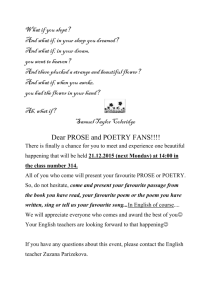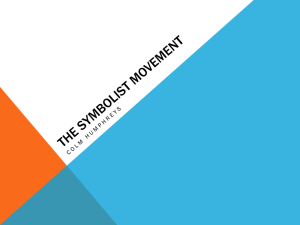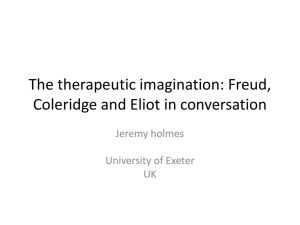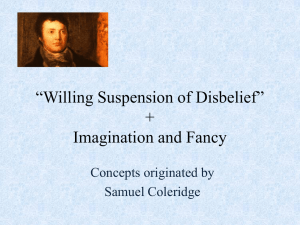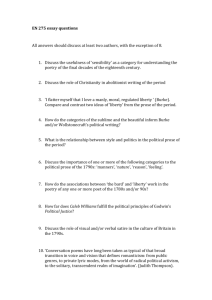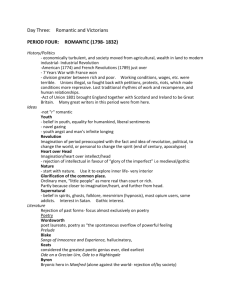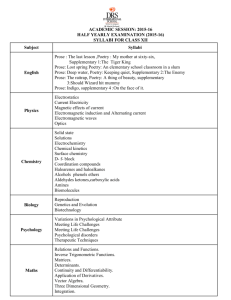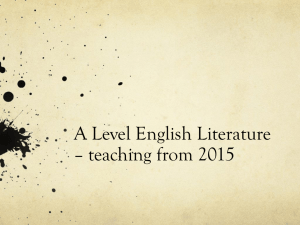PROJECT : Eric Dayre
advertisement
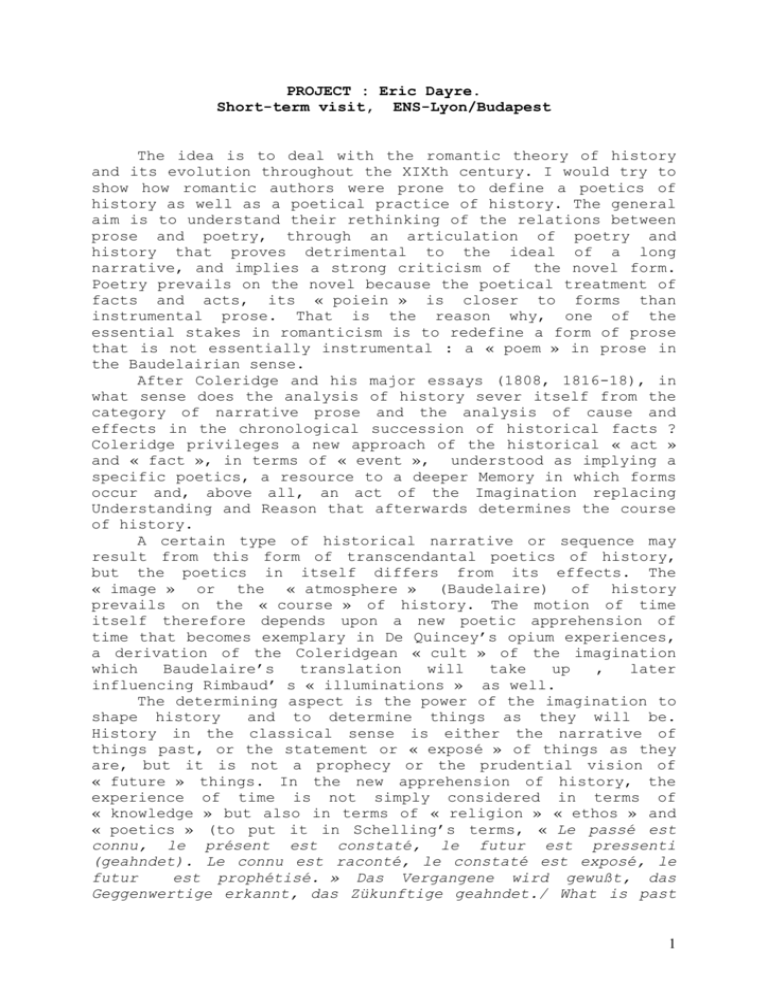
PROJECT : Eric Dayre. Short-term visit, ENS-Lyon/Budapest The idea is to deal with the romantic theory of history and its evolution throughout the XIXth century. I would try to show how romantic authors were prone to define a poetics of history as well as a poetical practice of history. The general aim is to understand their rethinking of the relations between prose and poetry, through an articulation of poetry and history that proves detrimental to the ideal of a long narrative, and implies a strong criticism of the novel form. Poetry prevails on the novel because the poetical treatment of facts and acts, its « poiein » is closer to forms than instrumental prose. That is the reason why, one of the essential stakes in romanticism is to redefine a form of prose that is not essentially instrumental : a « poem » in prose in the Baudelairian sense. After Coleridge and his major essays (1808, 1816-18), in what sense does the analysis of history sever itself from the category of narrative prose and the analysis of cause and effects in the chronological succession of historical facts ? Coleridge privileges a new approach of the historical « act » and « fact », in terms of « event », understood as implying a specific poetics, a resource to a deeper Memory in which forms occur and, above all, an act of the Imagination replacing Understanding and Reason that afterwards determines the course of history. A certain type of historical narrative or sequence may result from this form of transcendantal poetics of history, but the poetics in itself differs from its effects. The « image » or the « atmosphere » (Baudelaire) of history prevails on the « course » of history. The motion of time itself therefore depends upon a new poetic apprehension of time that becomes exemplary in De Quincey’s opium experiences, a derivation of the Coleridgean « cult » of the imagination which Baudelaire’s translation will take up , later influencing Rimbaud’ s « illuminations » as well. The determining aspect is the power of the imagination to shape history and to determine things as they will be. History in the classical sense is either the narrative of things past, or the statement or « exposé » of things as they are, but it is not a prophecy or the prudential vision of « future » things. In the new apprehension of history, the experience of time is not simply considered in terms of « knowledge » but also in terms of « religion » « ethos » and « poetics » (to put it in Schelling’s terms, « Le passé est connu, le présent est constaté, le futur est pressenti (geahndet). Le connu est raconté, le constaté est exposé, le futur est prophétisé. » Das Vergangene wird gewußt, das Geggenwertige erkannt, das Zükunftige geahndet./ What is past 1 is known, what is present is discerned, what is future is divined. The known is retold, the discerned is represented, the divined is foretold.). How does the imagination intervene in the sense of this « pressentiment », divining, foreboding ? or prophecying ? in the sense of regulating the negativity of things to come, or even in the sense of making things happen? The defence of historical images and prophecies — the defence of the poetical scanning, so to speak, of history, hence the idea of a specific rhythmical imagination acting in history, or acting out meanings that cannot be separated from a sense of timing, and consequently the idea that meaning cannot be separated from a specific rhythm — runs counter to the usual concept of a narrative exposition of history, and involves a new conception of time or « timing » and such notions as the « historical moment » , or « decisive » moment, a different conception of historical « acting » and not « actus », ort « act ». The ideas of the «instant », along with the reference to the « eternal instant of the Mystic experience, and of the « event » are key notions here ; and I will therefore try to map out the relation between concepts of « time » and the poetics of romanticism. I will begin with Coleridge’s prose essays : The Statesman’s Manual and The Friend, then follow up with De Quincey’s and Shelley’s reading of Coleridge’s politics and poetics, the influence of De Quincey on Baudelaire and Baudelaire’s prose, poetry and theory of translation, and I will finally examine Rimbaud’s relation to politics and the idea of history which also involves a recognition ( a form of « translation » and « reservation ») of the problem (the unforeseeable negativity of future times) of romantic « historiography » . 1/Coleridge. The Statesman’s Manual, the Lay Sermons and The Friend are major texts because they provide the philosophical, moral and political contexts within which Coleridge produces the notion of « tautegorical symbol » opposed to « allegory », and the idea that the power of the imagination essentially differs from fancy in its ability to achieve a sense-form that is valid as a true historical sign. Coleridge’s prose essays do not dissociate politics from moral thought, aesthetics and poetics, and that is the reason why they form a cluster in which the « romantic imagination » becomes the wide equivalent of the « imagination of history». I will refer to two counterpoints that set off Coleridge’s position. a / The German influence on Coleridge’s idea of form (Bildung/ Form, Einbildung, Image, Bild, « making into one », « In- Einbildungskraft », according to his puns) largely depends upon a reading of German philosophy, from the mid 2 18th to the first quarter of the 19th century (natural philosophy, kantian critique, idealism ). These three moments all receive some sort of response and treatment, which also involve Coleridge’s own strategies of conversion. While shaping his theory of the imagination as a key to the historical event, Coleridge addresses various topics such as — Schelling’s conception of Mythology, — the hermeneutical definition of the Historian as distinguished from the poet. — the difference or identity of the Poet and of the Founder of historical moments (with his specific reference to Luther, Coleridge’s idea of Protestantism and his way of choosing Luther rather than Milton, for example). — The question of Religion, through his view of the modern translation of the Scriptures. his conception of style as opposed to the existing conceptions of style among historians, formerly Gibbon, and slightly later, Macaulay, who both understand the necessity of style in history from the point of view of historians. b/ the readers of Coleridge will challenge the master, while being at the same time equally obsessed by the links of poetics (the poetics of prose in de Quincey’s case, and the poetics of poetry in Shelley’s ), imagination and history. I will mainly focus on the conceptions of temporality in De Quincey’s works, both in the sense of poetical timing, and historical time. Their reactions are not often explicit or clearly aimed at Coleridge’s concepts, but they nonetheless address Coleridge’s thought process and conclusions, Coleridge’s use of form, of « thought-form » and his tentative transfer or conversion of form into conceptual thought. De Quincey bases his writing on some of Coleridge’s theses, but he eventually refuses Coleridge’s conversion of form into thought. He in fact returns to the fouding models of prose history, placing Herodotus, the founder of history and historical prose, at the center of his idea of prose style and « prose fugue ». De Quincey chooses to give up the notion of the tautegorical or symbolical imagination, and in so doing, he reverts to notions that are apparently more technical and classical : « style », « rhetoric », « rhetorical fancy » ; but in fact, he so modifies these notions to address Coleridge’s poetics, and in doing so he considerably modifies Coleridge’s understanding of the mission of writing, and above all, he considerably changes the meaning of text-timing. He therefore constantly, albeit quite tacitly, subverts the idea of the tautegorical symbol. The case is somewhat different with Shelley, but clearly the bone of contention with Coleridge lies in Shelley’s usage of allegories, that do not pretend to reach up to the status of organic symbols. Shelley’s allegories, as distinguished by Walter Benjamin, in a rare occurrence of the Passagenwerke, 3 can also be understood conservative poetics. as an attack upon Coleridge’s 2/Baudelaire. Baudelaire knew Coleridge mainly through De Quincey’s interpretations. Baudelaire’s works (proses, poems and translations). Baudelaire adapts the question of the relationship between the conception of history and the romantic imagination in his own way, through De Quincey and Poe. I will concentrate on Baudelaire’s idea of « une modernité plus abstraite », when he builds upon the idea of « Modernity » that would be or is « more abstract ». This abstraction qualifies Baudelaire’s poetics in two ways ; as it runs counter to the culture of sensation ; as it lays the emphasis on the thought processes and dynamic questioning inside the poetics of creation : a poetics of abstraction which directly addresses the purport of Coleridge’s « tautegorical symbol ». Baudelaire produces a poetics of the conception of poetry, which is linked to the type of transcendantal analysis of poetry and imagination which we originally find in Coleridge, and later in De Quincey, Shelley and Poe’s later qualifications. The fact that such relations and such a « framing » of poetics are established through the grid of Baudelaire’s translations is also a key problem for me. In Baudelaire, we find a new way of placing the question of history in terms of images (« cultes des images »), ethos « passion, spleen », religion and philosophy (« ideal »), in terms of modernity, transitory, eternal, fugitive, historical, political time, in terms of translation as well as in modes (modernity is the time of « modes ») of genres and styles, according to their correspondent ability to express and « translate » the « spirit » of the time. 3/ Rimbaud. The specific relations between political history and the poetics of sense and sensibility in Rimbaud’s work will be the final stage. I will come to it from the inside examination of Rimbaud’s historical positioning of poetry in poetical works. I will particularly focus upon Rimbaud’s negative « actions » and statements, his taste for refusal and explicit polemics, or Rimbaud’s « negative moves » such as we have in the ambivalent phrase « je réservais la traduction » — which is the sole occurrence of the words « réserver » and « translation » in Rimbaud’s work. Rimbaud’s « negative action », his « réserve » or his way of playing with « translation », the ambivalence of negativity in his poetry are, I think, his peculiar way of imaging and staging his « practical idea » of « poiein ». I will also approach the problem of Rimbaud’s historical imagination, from outside references, as I will focus on the contemporary emergence of a « political Rimbaud » and the various attacks upon the political approach of Rimbaud’s 4 poetry (Pierre Gascar, Rimbaud et la Commune, Jean-Marie Gleize, A noir, J. Rancière révoltes logiques, Eric Marty « Rimbaud et la fable de l’Adieu »). 5
